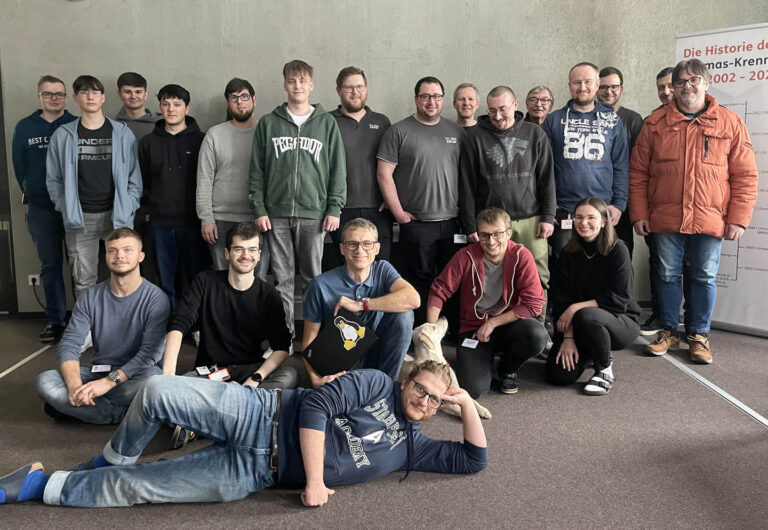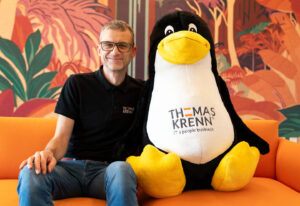How Thomas-Krenn Drives Linux Knowledge Forward

As a manufacturer of customized server and storage systems, Thomas-Krenn.AG is known throughout Europe for high-quality hardware — but equally for its commitment to the open source philosophy. From its early days in the 2000s, the company, headquartered in Freyung, Germany, was one of the first server manufacturers to support Debian Linux. For many years, Thomas-Krenn has been a partner of the Linux Professional Institute (LPI), and in 2024, the company qualified as a Platinum Solution Provider. We spoke with Werner Fischer, Product Manager for Security, Research, and Development at Thomas-Krenn, about the company’s own Linux User Group, why it encourages its employees to obtain LPI certifications, and the value of sharing knowledge.
Werner, Thomas-Krenn.AG has now been a Platinum Solution Provider for one year. How do you look back on this past year?
We have been a partner of LPI for over ten years, but due to structural changes and the pandemic, the partnership was briefly interrupted. We are very happy to now be an official partner again — and to once more make it clear, both internally and externally, how important Linux is to us as a company. Not only for ourselves but also for our customers.
What was the starting point for becoming a Platinum Solution Provider as a hardware manufacturer?
There were several factors. We offer various services, including providing turnkey Linux-based solutions to customers — for example, through Proxmox VE appliances. We submitted several of these activities as part of the process to qualify as a Platinum Partner. But our Linux User Group also played a role.
Can you tell us more about the Linux User Group?
The idea came up rather spontaneously about one and a half to two years ago. Across all departments, we have around 250 employees at Thomas-Krenn, and there are people in almost every area who have worked with Linux, either privately or professionally. We wanted to create a framework to meet internally and exchange ideas about Linux — and that’s how the idea of a Linux User Group within the company was born.
How much interest was there?
At first, I expected maybe ten colleagues would want to join. But very quickly, we had over 50 interested people. That means that about 20 percent of our employees are part of the Linux User Group. We meet regularly during working hours to discuss Linux topics.
So Thomas-Krenn.AG pays you to invest time in Linux?
Exactly. Highly qualified employees are very important to us, which is why the company supports this initiative. The exam fees are covered, and internal training takes place during working hours. Even former colleagues are still involved — for example, Manfred Schlutz, a long-time employee who is now retired. He has been involved with Linux from the very beginning, including over ten years ago when we organized an event in Warsaw together with LPI.
What do you do in the Linux User Group?

Werner Fischer, Product Manager for Security, Research, and Development at Thomas-Krenn
One of our main projects last year was hosting a 14-week Linux Essentials course in-house. Several colleagues have now successfully completed their exams. This wouldn’t have happened without the Linux User Group. And being an LPI partner made the whole process a lot easier, of course.
I’m also a certified proctor myself, and I take that role very seriously. If I caught someone cheating, they would be out of the group immediately — my reputation as a proctor is more important to me.
Why does Thomas-Krenn.AG invest in LPI-certified employees?
Because it just makes sense. More know-how means better service — whether in support, selecting components, or testing hardware with Linux. Certified employees improve quality, and we increasingly see this as a key factor for our customers when they decide where to purchase hardware and services. LPI certification is also sometimes explicitly mentioned in tenders. You can tell that these certifications are highly regarded in the business world. It’s a win-win-win situation — for the company, for the employees, and for the customers.
Which departments have certified employees?
By now, we have certified colleagues from five departments: internal IT, which operates our own server infrastructure; the support team, which works directly with customers; product management, which decides which products we offer and design; systems engineering; and quality assurance within our production department. Some hold just a Linux Essentials certificate, while others are LPIC-3 certified. Employees from other departments are also participating in the courses to earn their certifications.
What role does Linux play at Thomas-Krenn in general?
A very important one. Linux was one of the reasons why Thomas-Krenn became so successful in the market. From the very beginning, we tested our servers with Linux — specifically with Debian Linux. Back in the early 2000s, no other manufacturer was testing servers with Debian. We did, and we officially supported it. Many of our customers use Linux, especially in server environments. That has been a key factor in our company’s success.
How important are open source and free knowledge for Thomas-Krenn.AG?
They have always been extremely important to us — including the belief that knowledge should not just stay within the company but should be shared with our customers. One example of this is our Thomas-Krenn Wiki, which we launched in March 2008. As of today, we have published 1,935 articles there. About half of them are also available in English. Not all of them yet, but we are continuously working on it.
Why is it beneficial for everyone to share this knowledge?
Because it helps both our customers and the company itself. It ensures transparency and reduces support requests. We are also very open about bugs or issues. Many wiki articles start like this: “This issue exists, and we don’t have a solution yet. Here’s a workaround — it’s a bit of work, but it’s the only option we currently have. We will update the article as soon as we know more.” We’re not afraid to publish things that might not sound great from a marketing perspective. But it has always been clear to us that we want to be honest with our customers. We don’t hide anything, because nobody would benefit from that. Problems can occur anywhere — and we’ve always had a very open-minded approach to this.
What drives you at Thomas-Krenn?
Above all, we are motivated by the goal of inspiring and supporting our customers, offering them the solutions they need to run their IT reliably, securely, and with confidence. And especially to enable them to operate their IT independently. Many things run in the cloud, and that makes sense in certain areas. But we also see the limitations of third-party computing and the advantages of being able to make autonomous decisions without being dependent on a single provider. That’s exactly where we want to support our customers in the best possible way — whether with open-source solutions or commercial products where they are necessary.
